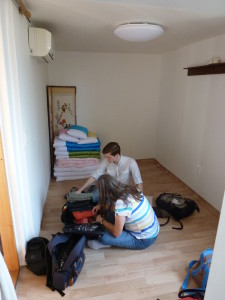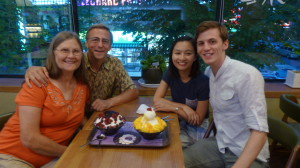Between South Korea, where our son lives, and North Korea, is a stretch of land called the DMZ. In fact it is the heaviest militarized border in the world. It is what you might call a ‘no man’s’ land, extremely unwelcoming and dangerous.
Suleika Jaouad wrote an insightful blog about such a place in her cancer journey that resonated with me. She describes the transition from where it was difficult to say, “I am a cancer patient,” to where that statement defined who she was. I think most people think that when a person is ‘cured’ of cancer, all is well. Close that chapter and move on. But even after the ‘cure’ is found and the cancer is gone, there is a place that is in some ways the hardest part of the journey: the land in between sickness and wellness, filled with anticipation of the next illness and the myriad of medical, financial, professional and psychosocial issues to deal with. There is the search for and deep longing to find the person you once were. Few know this, but the caregiver goes through the same process. The task of rebuilding your life is as confusing as it is disrupting. Cancer doesn’t affect only the cells that the chemo destroyed. “Cancer affects all of who we are.” (Xeni Jardin, cancer survivor) Susan Sontag wrote, “Everyone holds dual citizenship in the land of the well and the land of the sick.”
But there is also another citizenship we hold in the no-man’s land between those other kingdoms. For those with suppressed immune systems that land’s borders are very wide and extensive. The recent recurrence of my graft-Versus-Host Disease reminds me I am still in that transitional place. It seems a useless struggle to try to “go back” to where we were, however strong the desire to do so. You cannot step in the same stream twice. There really is no ‘going back’, only going forward. Forward to a ‘new normal’, whatever that might be.
Have you ever been in a ‘no-man’s land’? Maybe it wasn’t one marked by military occupation or cancer. There are no-man’s lands in relationships with our spouse, our children, and our friends. There are those transitional deserted dry places in our relationship with God. Whatever your no-man’s land experience, you recognize the painful interlude between one chapter and another in your life. It’s a waiting room where we feel we cannot either move backward to where we were or forward to where we want to go.
Your no-man’s land is both unwelcoming and dangerous because it tempts you to feel abandoned. But do not fear. You are not alone. For those of faith, the great promise is that God will go with you and show you the way. In fact, he has already gone before you and prepared a place for you that you haven’t realized yet. No-man’s land is a place for meeting God, even if you are sure there are no more lessons remaining to be ‘learned’, even if it seems a waste of time and energy and life itself. God doesn’t waste pain. and you are not here forever. God will bring you to a place that you can not travel alone, apart from him. Faith will guide you there. Faith doesn’t make the journey easy, but it does make it possible.
Blessings to my fellow sojourners.






 In the western world, we often defer respect to our guests when they enter our homes. If a guest starts to remove their shoes at the door, more often than not they may be greeted with, “Oh don’t bother; leave them on by all means.” But not so in Korea.
In the western world, we often defer respect to our guests when they enter our homes. If a guest starts to remove their shoes at the door, more often than not they may be greeted with, “Oh don’t bother; leave them on by all means.” But not so in Korea.
